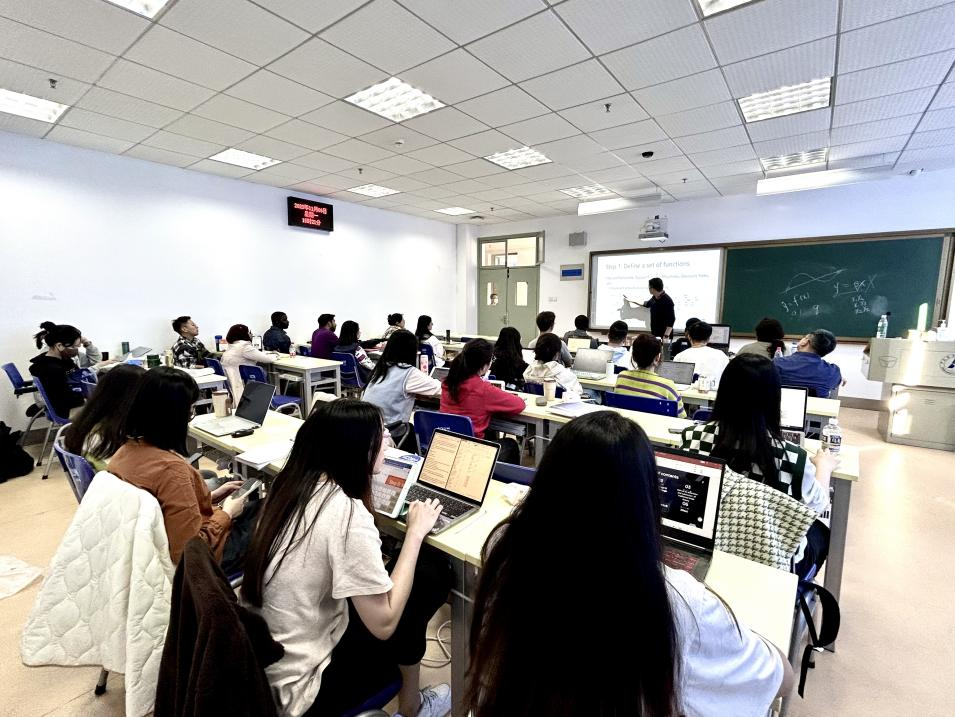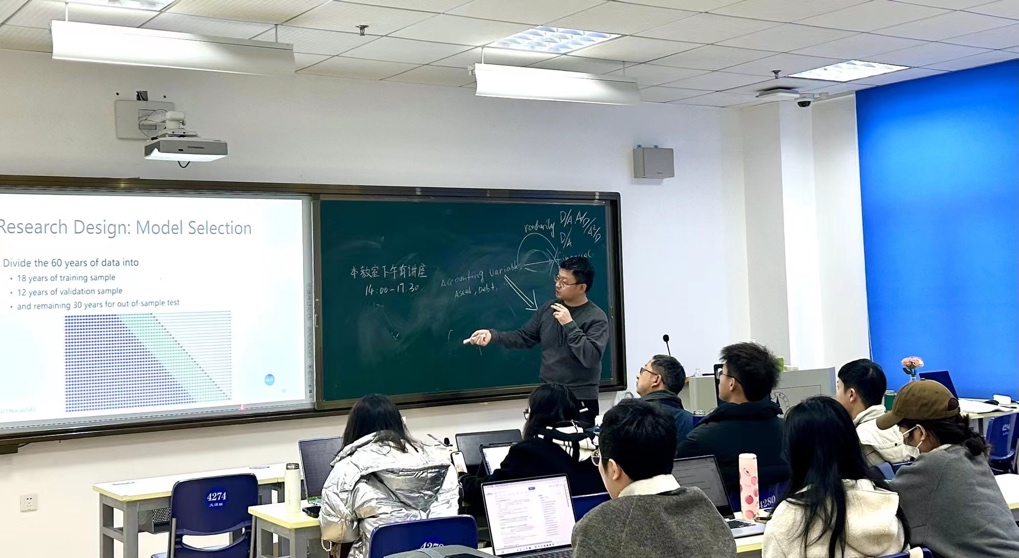“Machine Learning and Finance" Lecture Series Successfully Held
(Reporter Liu Lingxi) On November 6 and 13 at 14:00, the Machine Learning and Finance lecture series was successfully held in the Wenhuan Building, Room 437. The guest speaker for this series was Professor Li Bin from the School of Economics and Management at Wuhan University. The lecture was chaired by Professor Gu Lulu from the School of Finance, and was attended by some faculty members from the School of Finance and more than 50 postgraduate students, including international students.
Professor Li Bin's lecture series began with an introduction to machine learning in the field of finance and four application scenarios. Professor Li believes that artificial intelligence is surpassing humans in many fields, and this technology is also changing the financial industry. Financial research is gradually showing 4V characteristics: large volume and high dimensions of data (volume), fast growth and processing speed (velocity), diverse and nonlinear interactions (variety), low signal-to-noise ratio and value density (value). This has led to challenges in dealing with high-dimensional pricing factors and in sustaining effective explanations of the impact of nonlinear factors, thus increasing the complexity of predictions and presenting challenges to empirical asset pricing.
Professor Li compared the logical analytical paths of machine learning and traditional econometric analysis, introduced commonly used functions in machine learning, and finally discussed the application of machine learning in finance through literature case studies. Common machine learning functions include linear regression, neural networks, decision trees, ensemble models, etc. The machine learning process requires the selection of algorithms specific to the learning problem, followed by comparative research on the fit of the functions. Machine learning selects hyperparameters by dividing the sample data into three subsets for training, validation, and testing, using cross-validation methods, and expanding the training set with rolling or expanding windows to select the best model to achieve predictive functionality. For specific model methods, it is important to have highly relevant features and to measure the importance of these features.

Professor Li Bin Giving a Lecture on Machine Learning

Professor Li Bin and the Attendees at the Lecture
Professor Li pointed out that a key step is how to apply non-traditional data such as text, images, and videos in financial research. In text analysis, for instance, we need to first obtain unstructured data from various materials, followed by format parsing and data cleaning, then construct text feature fragments, identify word categories using dictionary methods or machine learning, and subsequently construct text indicators to obtain text related to the research content. Finally, text features are used to analyze influencing factors and economic consequences. For example, corporate culture indicators are constructed from financial report texts.

Professor Li Bin Teaching Application Cases
Next, Professor Li further taught the various possibilities of machine learning research in the field of finance through authoritative journal articles and his own work-in-progress papers. In the application of Machine Learning and Fraud Detection, Bao et al. (2020) developed a fraud prediction model using machine learning methods, selecting raw accounting number models based on existing accounting theories, and using ensemble learning methods. The study showed that the new fraud prediction model significantly outperforms the other two baseline models.
In the application of Machine Learning and Predicting Stock Returns, Gu et al. (2020) simulated real investment research empirical asset pricing, comparing machine learning methods to solve typical problems of empirical asset pricing: measuring asset risk premiums and demonstrating the significant economic benefits that machine learning predictions bring to investors.
Professor Li Bin and colleagues (2019) systematically applied machine learning methods to enhance stock return predictions in fundamental quantitative investment. By employing predictive combination algorithms, Lasso regression, and other machine learning methods to construct stock return prediction models and investment portfolios. Empirical results show that machine learning algorithms can most effectively identify anomaly factors.
In his working paper Real-Time Machine Learning Applications in Empirical Asset Pricing, Professor Li constructed a global real-time machine learning strategy based on fundamental signals, identifying market anomaly factors that performed significantly better than traditional market pricing factors in out-of-sample tests, especially in value-weighted investment portfolios.
In Machine Learning and Predicting Mutual Fund Returns, Li et al.(2020) found that combining individual mutual funds' stocks with a large number of stock features (factors) results in a nonlinear relationship between fund performance and fund factor risks and their interactions. This characteristic means that machine learning methods are clearly superior to the standard linear framework.
At the end of the lecture, Professor Li concluded that machine learning is an emerging field in econometrics worth exploring in-depth. Everything in the world is data we need, using data to prove points instead of just talking. Only by engaging in practical application can one truly learn machine learning methods. Professor Li Bin also guided students in code training.

Group Photo of Attendees and Teachers
[Guest Introduction]
Li Bin, Professor and Ph.D. supervisor at the School of Economics and Management at Wuhan University, is the head of the Department of Finance and the Director of the Financial Research Center. His research focuses on financial machine learning, empirical asset pricing, and financial technology. Professor Li has an interdisciplinary background and research capability in finance + technology, has published multiple papers in financial accounting journals such as Journal of Accounting Research, Financial Research, China Industrial Economics, Journal of Management Science, and in computer CCFA class journals and conferences such as AIJ, JMLR, ICML, IJCAI, and has published the monograph Online Portfolio Selection: Principles and Algorithms in the United States with CRC Press. He has led multiple projects funded by the National Natural Science Foundation of China, and the assessment of completed young scientist projects was rated as excellent. He is a Hubei Province Chu Tian Scholar, a Luojia Young Scholar of Wuhan University, and the leader of the Young Academic Team of Humanities and Social Sciences at Wuhan University; he is also a Chartered Financial Analyst (CFA) certificate holder. He has won the Second Prize for Excellent Papers at the 18th China Financial Annual Conference, and the 2019 Renmin University of China Photocopied Newspaper Materials Economics category most popular article award, among others.